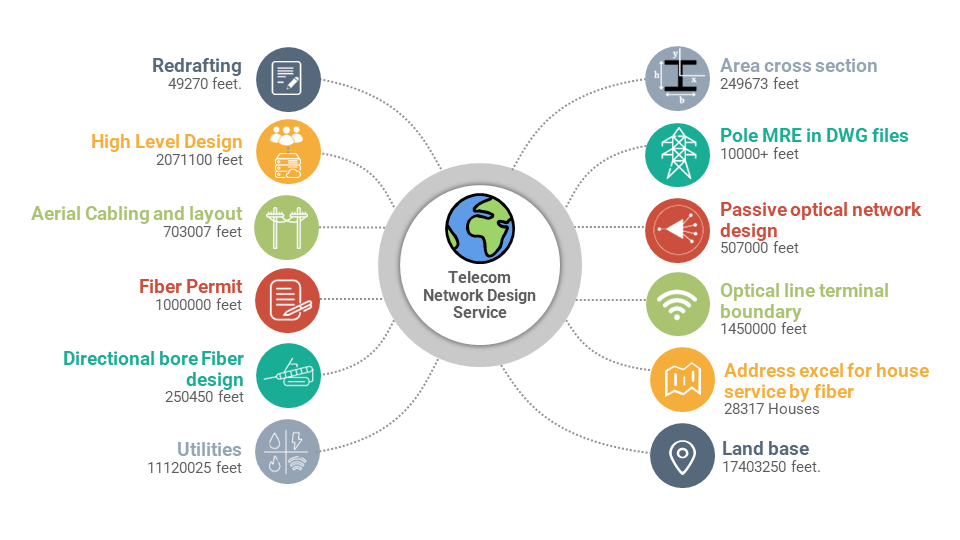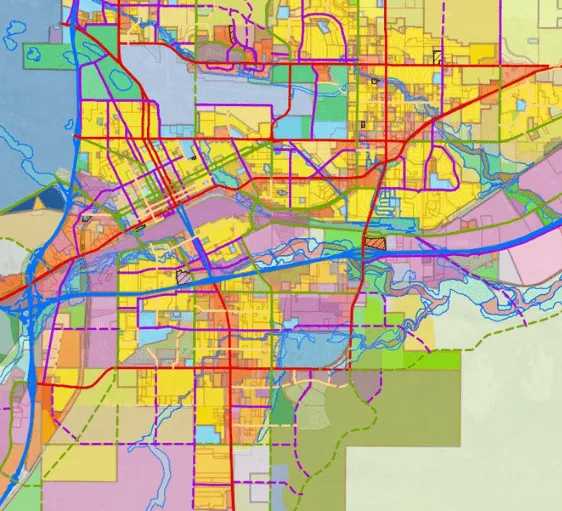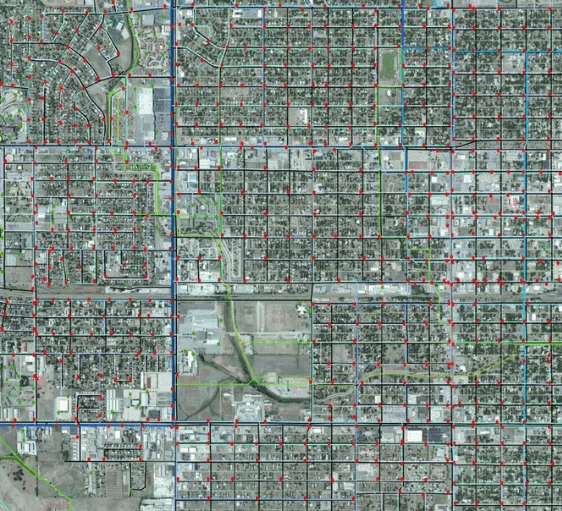Telecommunication
GIS Telecommunication Mapping & Network Design Planning
Scadd has successfully supported several customers across the Telco design and drafting services known as GIS Telecommunication Mapping with a purpose to support global Engineering, Procurement, and Construction (EPC) service providers in planning, designing, managing, and upgrading telecommunications networks. The following are our primary services for the international telecom sector:
Our GIS Telecom Network Mapping & Design Service

What We Do In FFTH Network Design & Mapping
Fiber and Broadband
FTTx design and drafting services
SCADD IT supports fiber networking by rendering services.
These services include FTTx network design, network data collection, asset data and physical network inventory, As-built drawings (ABD) production, network data migration from different platforms to a single platform, and network As-built data (OSP/ISP) updates. The following are some of the FTTx design and drafting services we offer:
Preliminary network design and drafting
Low Level Design (LLD)
High Level Design (HLD)
FTTx network update
FTTx / Fiber cable routing
Permitting
SCADD helps customers obtain permits from authorities.
(City, County, DOT, Pole owner, Railways etc.) for the initial construction, installation, and operation of all telecommunication networks, in accordance with requirements, procedures, appeal process, and revocation process. With the assistance of base map data from our clients, our team prepares ROW applications, Way Leave agreements, Pole permits, and DOT applications. SCADD offers the following Permitting services:
Identification of Complex & Non- Complex, Blanket Permits
ROW & Land base feature Integration
Location Map / Layout
Preparation of Permit Drawings
Documentation as per the permitting authority standards
Construction Packages
SCADD provides executable construction packages for construction of telecommunication networks.
Our task packs streamline work efficiency by incorporating essential documents such as single-line diagrams (SLD), splice sheets, and bills of materials/bills of quantities (BOM/BOQs). These comprehensive construction packages encompass a range of services aimed at optimizing project execution.
Preparation of Bill of Quantities (BOQ/BOM)
Identification of Aerial and Overhead Networks
Preparation of Fiber maps and Splice Diagrams
Preparation of Traffic Control Plans (TCPs)
Preparation of cross-sectional details
Capture and representation of construction sheets highlighting land base, existing utilities, proposed lines, and stationing
Geodata and Land-Base
Geodata for RF Network Planning
SCADD Geodata for RF Planning services offer geographic data layers designed for radio frequency (RF) propagation to assist engineers in refining their signal loss prediction models based on the features of the underlying terrain and ground cover.
Geodata for RF Planning requires mapping land cover data, which is essential for wireless network design since surface cover influences digital wireless signal propagation. Clutter data in Geodata for RF Planning refers to man-made and natural characteristics that might interfere with radio frequency propagation by reflection, diffraction, absorption, or scattering of transmission waves. Engineers can determine the best position for towers by combining Clutter data with elevation data (DEM), physical attribute data, and propagation models using RF software programs. The following are the main data sets offered:
3D Building datasets of select city pockets
2.5D height-based clutter datasets for specified city areas
2D City datasets
2D regional or countrywide datasets
Population datasets
Administrative boundary datasets
Geodata and Land-Base
GIS Land-base
A GIS land base is made up of one or more layers of data that describe natural, anthropogenic, and cultural characteristics.
It serves as a foundation or backdrop for further layers of facilities and location-specific information. A typical GIS land-base map includes digitizing highways, parcels, and specified POIs according to the data model given by the customer. Our land-base services include the following:
Capture of building data within the Area of Interest
Capture of street data with specifications
Update of attributes with details for each feature
Assignment of Unique ID for every feature
How Does GIS Telecommunication Mapping Work?
Our team oversees the entire process from start to finish. During the planning stage, we evaluate multiple considerations. Using Geographic Information Systems (GIS) guarantees precise outcomes. Conventional obstacles have no impact.
01
Create Area file
02
identify Houses
03
Existing Utility find
04
Aerial and UG design
05
Packaging work
06
Pre-permit work
07
Area Cross section work
Why Choose Us
Why Choose Us For GIS Telecommunication Mapping Services?
As a GIS Telecommunication Mapping Solutions Company, our specialists use their hands-on experience in geospatial data services and advanced GIS software solutions to create digital twins, cloud platforms, and customer-centric solutions.
Fast turnaround of your GIS projects
First Time Right permitting drawings
Accurate GIS documentation
Reduce cost of spatial data analysis
FAQ
What is GIS mapping in telecom?
GIS mapping in telecom refers to using Geographic Information Systems (GIS) technology to map and analyze telecommunications infrastructure, including network components, coverage areas, and service distribution.
What is mapping in telecom?
Mapping in telecom involves visually representing network infrastructure, service areas, and other geographical data related to telecommunications operations using specialized software and tools.
Can GIS be used for mapping?
Yes, GIS (Geographic Information Systems) is commonly used for mapping in various industries, including telecom. It allows for spatial analysis, data visualization, and mapping of infrastructure, resources, and services.
Is GIS digital mapping?
Yes, GIS is a form of digital mapping that integrates geographical data with attribute data, enabling the creation of interactive maps, spatial analyses, and data-driven decision-making in various sectors, including telecom.






